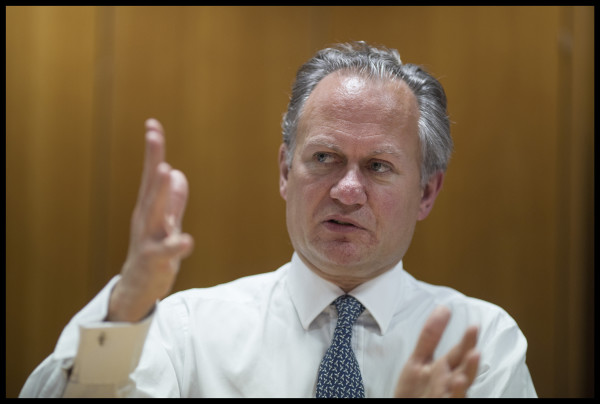

The chief executive of Old Mutual Global Investors predicted the pound has yet to hit rock bottom, as he revealed why his £2.2bn fund failed to outpace its peers.
Speaking to FTAdviser, Richard Buxton, who runs the Old Mutual UK Alpha fund, said the markets are becoming increasingly sector-driven, largely because of the surging popularity of exchange-traded funds which focus on specific sectors.
“People are flipping between one basket of stocks to another, which has exacerbated the problem.”
“I have no issue with the volatility of share prices if people are rushing in and out of stocks and sectors, but it has got more extreme,” he said, pointing to the huge fluctuations in share prices which can occur after minor shifts in analyst predictions.
One way the fund management industry can cope with these market tremors is by being more active about trimming and adding to positions within portfolios, he said.
When it comes to his fund, however, the investment veteran said it was fortunate that most of his clients are invested in his fund for the long run.
“They have been through the good and the bad; they recognise it will be a volatile ride but that they usually get there in the end.”
The Old Mutual chief has always advised investors in his fund to be patient, particularly after it suffered a bout of bad performance.
Over the past three years, the fund has returned 9.7 per cent, lagging behind the IA UK All Companies sector which has returned 16.2 per cent, according to figures from FE.
Mr Buxton admitted this was the worst three-year period in the fund’s history, but was confident it has turned a corner as the markets embarked on a shift half-way through last year.
“I’ve never known of a period of such extreme change; we have moved a long way in a very short amount of time, particularly since the US presidential election when both bond yields started to back up and equities rallied.”
He said a large part of the underperformance over the past couple of years was due to bond yields reaching such low levels.
“If we are right that we have moved into a different environment as yields start to rise then that will be supportive of the financial stocks that I hold,” he said, pointing out that almost a quarter of his portfolio is exposed to financial firms such as banks.
“If there is a gentle de-rating of some of these expensive growth stocks then that will help too.”
He also admitted he had made some mistakes with his stocks, such as holding onto Rolls Royce, despite the company issuing a number of profit warnings.
“You will always make mistakes in this job by outstaying your welcome in some stocks or selling them too early.”
In the second half of the year, Mr Buxton’s fund was bolstered by its exposure to mega cap stocks, which have a large part of their earning overseas and can therefore benefit from the plunging pound.
He said a sharp rise in sterling would "take the shine off" his dollar-earning stocks, but the fund manager doubted whether the fall in sterling was over and suggested the pound could hit as low as $1.15.
Peter Lowman, chief investment officer at advice firm Investment Quorum, said he would "entirely agree" with Mr Buxton that fund managers need to react more to changes in share prices, "given that the world is now likely to enter a new paradigm with the change in political and economic events”.
Many active strategies have suffered from the impact of macro events, he said.
“However, it's likely that highly skilled fund managers, such as Richard, could have their day, given that there are numerous companies, and sectors, that look fully priced or perhaps over-valued.”
This, Mr Lowman argued, could mean a period of dilemma for many passive funds, while the stock pickers end up delivering a better performance.
“Clearly, we do live in a world of immense change, and as Richard has said the markets are becoming increasingly sector-driven, meaning that sector ETFs are playing a much more active role today than they did many years ago.
“However, what we look for in an active manager is a ridged investment process, a concentrated portfolio of quality businesses, buying stocks that may be mis-priced by the market, and taking advantage of sector bets if applicable.”
katherine.denham@ft.com



